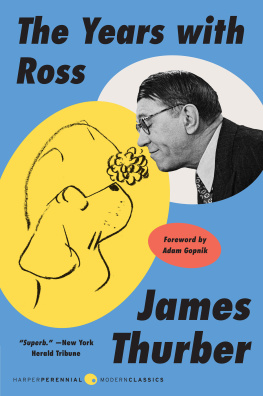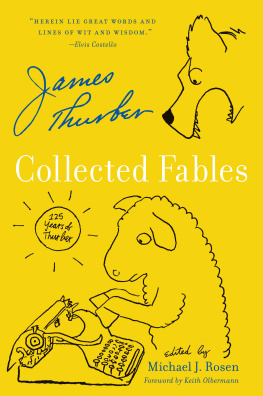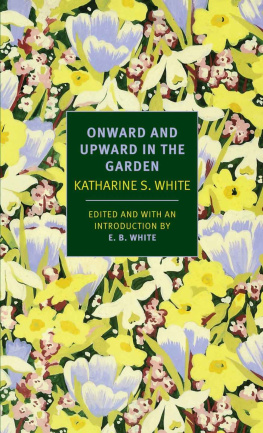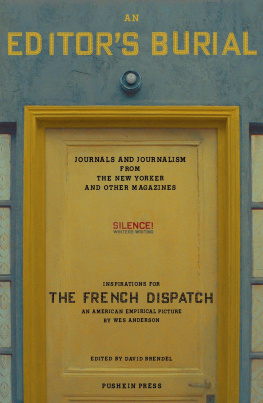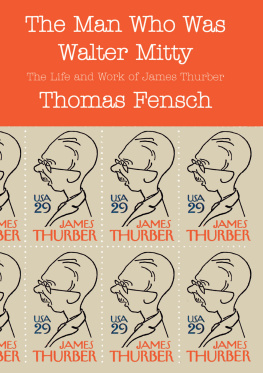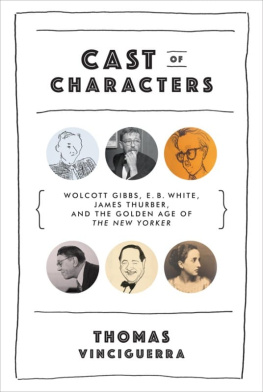Contents
Guide
To Frank Sullivan
Master of humor, newspaperman,
good companion, friend to Ross,
this book is dedicated with the
love and admiration I share with
everybody who knows him.
Contents
James Thurber wrote The Years with Ross toward the end of his most productive and gifted period, and he managed to make both less and more of his subject than he quite intended. More, because he turned Ross, the creator and first editor of the New Yorker, into a legend: the Casey Stengel of American letters, the guy who wanted to know if Moby-Dick was the whale or the man and scribbled Who he? all over his writers copy. And this, in turn, made less of Rossin the eyes of many New Yorker veterans, painfully lessbecause it turned him from the great and far-seeing editor they knew into a kind of Thurber husband who lucked out by hiring Thurber. For those who think that Ross really was like Stengel, i.e., a superb manager of talents who skillfully hid his shrewd judgment behind an assumed mask of colorfulness, it is easy to see Thurbers Ross as a caricature, or even a betrayal.
This wasnt Thurbers intention, of coursehis love for Ross shines from every page of his bookbut if a competitive subtext emerges, its no surprise. No writer really thinks he couldnt have done it all by himself. All writers pay extravagant compliments to their editors, while secretly thinking how lucky the editor is to have around a writer so magically adaptable and forbearing. In their hearts, writers think of editors as little as society ladies think of matre ds: one tips them heavily and listens wide-eyed to their advice on the menu, but the point is to keep that table. (And, in their hearts, all editors think of writers as matre ds do society ladies: spoiled, demanding childrenif only, sigh, you could run a restaurant without them.) Thurbers Ross is a wonderful comic figuretoo comic, perhaps, for the taste of those who revere him. But Thurber revered him too, and the special virtue of The Years with Ross is that he manages to make a completely comic creation into a convincingly heroic one. Thurbers Ross is half-beleaguered American white man, half-wide-eyed gee-whizzer; one part W. C. Fields on his sleeping porch, two parts the hero of Tom Swift and His Amazing Magazine; an aw-shucks farm boy from Colorado trying to land a 1900 biplane in the middle of Fifth Avenue, as Thurber himself put it so memorably.
What might help make this book matter for new readers in a new century (who can be assumed not to care less about how writers got paid under a drawing system in 1942) would be to take it away from New Yorker lore-making (and the New Yorker generally, and wouldnt that be nice) and to concentrate on the thing that truly makes it matter: the story it tells about how writers and editors together, in the years between Pershing and Pearl Harbor, made a new kind of American music. Between what Thurber and his contemporaries were able to put in and what Ross and his contemporaries knew to take out, a style emerged that still strikes a downbeat for most good American writing today. Putting the New Yorker asideand surely it is time we did; let the magazine speak for itself, as it must for as long as it livesthere is something permanent in The Years with Ross about how a writer learns to write, what an editor can teach him, and how the tone they shape together can be around for other writers when both of them are gone.
Thurber matters, still and first, because, even in his later, garrulous manner, his is one of the wonderful original voices of American writing. He is the most complicated, emotionally complex, touching, and original of all his generation of New Yorker writers. A. J. Liebling is funnier and larger-souled and infinitely more worldly. E. B. White is a more natural stylist (and the creator of a lot of whats good in Thurber). Joe Mitchell is a more precise and self-conscious artist, with an artists sense of the mystery in all simple things. But Thurber, though an eclectic writer, is the most volatile, difficult, and, in a good sense, moody of them allthe most emotionally direct and, therefore, the most memorable. The style of understatement he learned from White in particular involved imposing a certain amount of taciturn discretion and fastidiousness on a man who was neither indirect nor modest, and the marriage of the two thingsthe modest style and the boastful guy, the crazy man and the sane sentencesmade him among the most moving and soulful, not to mention one of the funniest, twentieth-century American writers.
He was also probably the best and purest tonal writer weve ever had. Thurber is a tonal writer in the simple sense that his is a voice we know rather than a set of jokes we laugh at. Where almost every comic writer before him comes at us in aphorisms or epigramsor else in the epigrams cousin from Milwaukee, the wisecrackThurber just makes sentences. (When he tried phrase-making, it always fell a little flat: Let us not look before us in fear, or behind us in nostalgia, but around us in awareness, which Ted Sorenson could have written.) Thurber is memorable in paragraphs and pages rather than in lines. He doesnt turn phrases; he just turns the corner on to the next sentence. No one worked harder or went further to slim down the space between American speaking and writing voices, between the way we talk and the way we write. (Auden said somewhere that the one writer whom Max Beerbohm must have envied would have been Thurber, because he did with a natural sound what Beerbohm achieved with a lot of hard blowing.)
Though The Years with Ross is not Thurbers very best writing, the natural tone is still there, and rereading it recalls how hard it must have been to do every time he did it. Some of the difficulties arise for technical reasons. Though it is hard to write sentences that sound like talk, it is even harder to know how to put them together, since the conjunctions of natural speech are mostly pauses and ahems and interjections. Insert ands in their place and pretty soon, if youre not careful, youre stuck with a pseudo-biblical Irish croon, la late Hemingway, whether you want it or not.
There are tricks to getting around this, and Thurber knew them all. By the time he wrote The Years with Ross these tricks had become second nature to him so that his performance is a little like the late Luis Tiants accumulated guile and instinct after the fastball has gone. There is the use of the right deflating words: dogged, jumpy, and puzzled make their usual Thurberian appearances. There is the trust that the reader can make the connections between sentences for himself so that all the hences and thuss and therefores and of courses that afflict an ordinary journalists prose can drop right out. Look, for instance, at these simple sentences, chosen pretty much at random:
He let an editor go in the early years because the man brought his wife into Rosss office to meet him. Ross looked up and there she stood, seeming to be closing in on him from all sides. Very few women even among those employed there, could enter the inner sanctum of old Surrounded. Of the privileged females my second wife, Helen, was one.
This gets you just where youre going (from a general idea to a new person), uses a funny image (of the encroaching woman) to get you there, and leaves out three-fourths of the stuff that most of us would have felt compelled to put inall those apprehensive qualifications (who the editor was, when it happened, who Helen was, and what shes going to do in the story) that usually go hand in hand with memoir writing.
Yet, though the apprehensive qualifications are left out, an apprehensive nervousness is left in. Its funny that Thurbers literary hero was Henry James, who seems

